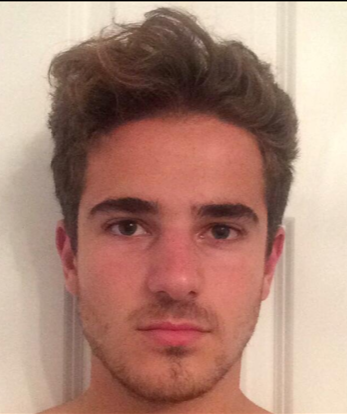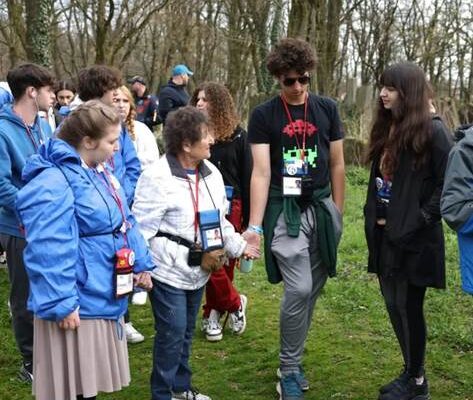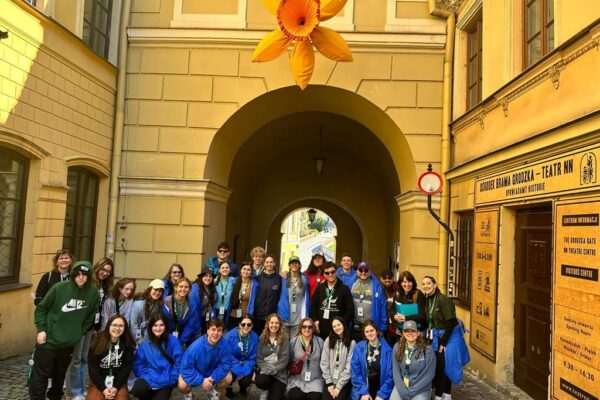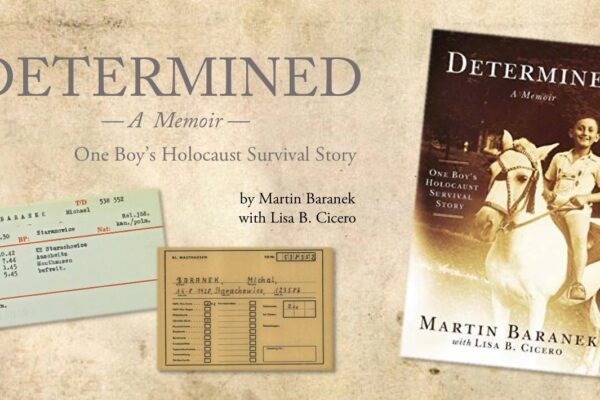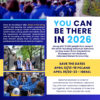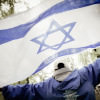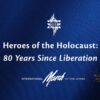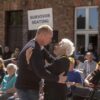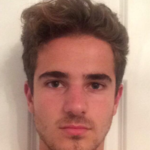
I write this reflective blog a few days after returning from March of the Living.
Despite the wealth of writing, research, and testimony on the Holocaust, I (and I would imagine most people) find understanding and clarity to be elusive. The Holocaust occupies a bizarre space in my head, blurring the lines between historical interest, both in its own right, and as a powerful tool in modern human rights activism, and a culturally ingrained emotional experience. This can often be disconcerting when I catch myself offhandedly referring to the Holocaust in a clinical and distanced way, but equally, I feel guilty for not paying due attention to the nuance when I react emotionally. Coming from this standpoint, it is difficult to feel that one has ever truly processed and reflected upon the lessons that can be taken forward. Having attended March of the Living last week, whilst I am certainly far from achieving clarity, a greater sense of how I view the Holocaust and its importance to modern life is beginning to crystalise.
First of all, I would like to express credit to everyone involved with March of the Living UK for what was a brilliantly run week. Agnes Kaposi, a Holocaust survivor who joined us on our journey, is probably the most inspirational figure I have come across. She has channelled the pain of her childhood into the most measured, intelligent and philosophical personality, with a playful and cheeky edge that put everyone instantly at ease around her. I attended March of the Living on the Youth Movement bus and was once again inspired by the young adults of the UK Jewish community. The intelligence, in particular the emotional intelligence, and the passion for the intentional spaces that they create, be it RSY-Netzer, Habonim-Dror, Noam Masorti, or another, was a pleasure to be a part of, and made me exceptionally proud of my own youth movement journey within RSY-Netzer. There are a lot of understandable fears around the future of Holocaust education as we sadly lose more and more survivors, but whilst passionate and ideological people such as those I met on the bus continue to educate, there is nothing to fear.
What lessons could I take?
As someone who has studied the Holocaust from numerous angles and with numerous agendas, I was unsure what new lessons I would be able to take. The depth and complexity of feeling at sites of mass atrocity is unlike any other and is not one that I will forget in a hurry. Neither will I forget the pride and power that I felt in my Jewishness marching and singing with 10,000 others on Yom Ha’Shoah. The discussions throughout my time there ranged from combatting modern antisemitism, to how we choose to honour and respect the memory of the Holocaust (after encountering a particularly obnoxious group of Americans), to the sadness at the loss of unique and vibrant Jewish communities and culture in places that were home for so many centuries. Each of these discussions, and more, merit their own spotlight but one particular site, and the thought process it generated, had the most profound effect on me, and how I view the importance of the Holocaust in the present.
Zbylitowska Góra, to me, was the most powerful place that we visited. In a nondescript forest, around an hour’s drive from Krakow, we encountered the mass graves of approximately 10,000 people, including around 1,000 children, and heard the harrowing stories of the sadistic pleasure taken by the Einsatzgrupen in these murders. The contrast of the peaceful and beautiful surroundings with the knowledge of what happened there jarred something inside of me. Perhaps (and I don’t like to admit this) I did not experience the same desensitisation that I had at more ‘iconic’ places such as Auschwitz or the Warsaw Ghetto. What really stood out was the small memorial dedicated to Polish Catholics in the village who were also murdered there for aiding Jewish people in some way. As far as history is aware, none of these people were successful in saving their Jewish neighbours, yet they tried. At the risk, and ultimately at the sacrifice, of their own lives, they made the choice to do what was right. Without hope, without witness, without reward.
When I said Kaddish at Zbylitowska Góra, I said it for them as well.
Can we all be ‘Righteous Amongst the Nations’?
It is often easy to put the ‘characters’ of the Holocaust into one of three boxes; victims, cartoonish ‘Raiders of the Lost Arc’-esque Nazi perpetrators, and the heroes who worked against them. Such a reading of the Holocaust is, in my opinion, reductive. As functionalist historians such as Christopher Browning (Ordinary Men) and Karl Schleunes (The Twisted Road to Auschwitz) show us, much of the radicalisation of the Holocaust resulted from the group dynamics of conformity, deference to authority, role adaptation, and the incremental altering of moral norms to justify their actions. Arguably the greatest ‘success’ of Nazism was how easy it became for people to actively participate in, or tacitly endorse, the regime. Indeed, as genocide became the primary function of state, of Reich, millions of people across continental Europe could be arguably regarded as passive perpetrators, and many hundreds of thousands were far more active, many directly profited (think companies like Bayer or IG Farben) even if they themselves did not identify with Nazi ideology.
It is interesting therefore that people often like to remark that they ‘would have done something’ if they had been around in Europe in the 1940s. Would they really? It is a massively difficult decision to risk your life, and even lay it down in the case of those at Zbylitowska Góra; far easier on a personal level to keep one’s head down. Co-operating in Nazi life was an understandable, if morally wrong, choice that people made. It allowed them to live their lives and spend time with their family and their friends unburdened by their privileged positions towards the top of the racial hierarchy by which Jewish people found themselves crushed.
It is against this tide that the ‘Righteous Amongst the Nations’ fought. These non-Jewish individuals, honoured by Yad Vashem, Israel’s Holocaust memorial, for risking their lives to aid and protect Jews during the Holocaust did so not for personal gain, but in recognition of the danger that they were placing themselves in to make the most difficult of choices and do what was right. For many, such as those which we mourned at Zbylitowska Góra, this choice cost them their lives. It takes an unbelievable level of moral conviction to risk it all to do what is right. In many ways, it makes me feel guilty for all the times that I have actively chosen not to engage in a social justice issue or breach of human rights because I ‘have other things going on’ or I do not feel a personal connection to it. Every time that I have bought fast fashion clothing that logically I know is only so cheap because of the indentured or modern slave labour that goes behind it but have told myself ‘I do really need some new jeans’. Whilst I do not claim these examples to be remotely the same as the Holocaust, if I cannot stand up against these injustices when there is no threat to my life or liberty (only mild inconvenience) can I really say I would have stood amongst the Righteous if I were in their position? Or would I, to paraphrase Martin Niemoller’s famous poem, have not spoken out, because I was not the one directly affected.
Today, we enjoy a far better world with far better protections than those that existed in the 1930s and 1940s. Immediately after the defeat of Germany, the Nuremberg trials set out the novel offences of ‘crimes against humanity’ and ‘genocide’ – concepts developed by two Jewish men who lost their families to the Holocaust; Herschl Lauterpacht and Raphael Lemkin. From this idea that in committing the atrocities of the Holocaust, Nazi Germany and its agents had ‘outraged the conscience of mankind’, the Universal Declaration of Human Rights emerged as a mirror to the Nazis actions. The ghettos and camps imprisoned, enslaved, and ultimately murdered millions, and in response came Articles 3, 4 and 5 protecting the right to life, liberty and freedom from torture. Jewish people (alongside Roma people and others) were stripped of citizenship, had businesses stolen, and were denied access to the infrastructure of state. In response came Articles 15, 17 and 19 enshrining rights to equal and universal access. We live in a Europe, the very continent that played host to the Holocaust, where these ideals are codified in the European Convention on Human Rights, where over 800 million people live in states over which this Convention and its protective Court hold jurisdiction. As human rights activists, we are not fighting the establishment as those Righteous did, we are the establishment, or at least we should be.
Yet, we must not be complacent, we continue to live in a world that enables, and arguably requires, injustice and persecution. From the use of child labour in the garment industry, to Uyghur persecution in China, to the treatment of migrants arriving in Greece, Turkey, and the UK, there is much to be done. Rightly, human rights activists and much of civil society are reacting in horror to creeping attacks by our government on the international instruments that form the human rights legacy of the Holocaust. A series of events set in motion by David Cameron telling Andrew Marr in 2012 that leaving the European Convention might be necessary to ‘keep our people safe’ has culminated in a crossroads moment. The Convention defines what we should strive to stand for as a nation; the rule of law, equality of opportunity and protection of the vulnerable from the excess of the majority. Yet, we have a government that seeks to pass legislation which it cannot confirm is compatible with the Convention representing these values. It seems abundantly obvious to anyone with any knowledge of the subject that it fails to do so on multiple counts, described by the UNHCR as ‘extinguishing the right of refugees to be recognised and protected in the UK’. The new amendments absolving ministers of their responsibility to abide by interim judgments of the European Court is a terrifying insult to the memory of the victims of the Holocaust, and yet the door continues to creak open toward full-scale departure.
The Holocaust represents the extreme depths that humanity is capable of plumbing when unchecked, as Jewish people, we have a particular understanding of this. During my time on March of the Living, I was told that I was bearing witness and had a responsibility to carry what I saw with me. I saw the power and emotional resilience of the Jewish community. I felt the loss of six million of our people, and the countless in the generations which would have followed. I also saw hope and humanity. I heard the stories of the Righteous who dared to be compassionate and dared to stand up for what is right. Their stories must hold us to the mark, to never willingly cede ground to forces of injustice and oppression, nor turn away from people in need because it is inconvenient.
As survivor Agnes Kaposi told my group on our final day in the Warsaw Ghetto – as long as there are those who remember, and act on that memory, Hitler did not win.
Originally published by By Alfie Futerman, René Cassin intern in René Cassin
